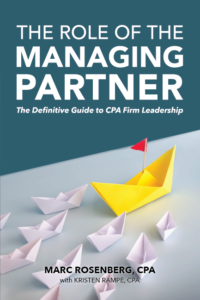Should Your CPA Firm Have a Full-Time MP AND COO?
![]() Marc Rosenberg, CPA / Feb 1, 2022
Marc Rosenberg, CPA / Feb 1, 2022
Question From a $12M Firm: We are setting out our strategy for the next several years and discussing the pros and cons of having a full-time managing partner and a full-time COO versus what we do today, which is to have these positions handled part-time by partners who work a day job serving clients. Part of our discussion is weighing the short-term vs. long-term cash flow implications.
If you were in charge of our firm, when would you have a dedicated CEO/MP position and a dedicated COO position?
Our Response: As is often the case with practice management issues, there are no rules, but what follows should give you some guidance.
First, let’s start with two maxims:
- In CPA firm management (and in life), just because most people do something a certain way doesn’t mean that it’s the best way or the right way. As you will see later in this blog, the vast majority of CPA firms don’t have full-time MPs, but that doesn’t make it a best practice.
- The biggest factor in optimizing a firm’s growth and profitability is effective management and leadership. More than bringing in business. More than productivity. More than leverage. More than having great talent. More than having specialties and niches. This belief is founded from over 20 years of our work with CPA firms. It’s as clear as day: great management makes all the other things happen.
-
- Effective management is very elusive and difficult for CPA firms. MPs went to college to get an accounting degree, not to learn how to manage a CPA firm. They rose through the ranks by honing their client service and business development skills, not by attending a managing partner school. Almost all MPs came up through the ranks as client service practitioners. Psychologically, it’s very difficult to give up client duties.
-
- At many firms, the partners aren’t willing to allow one of their own to shed all client duties to manage the firm full-time…AND sustain or even increase the new MP’s high compensation. Either overtly or covertly, many partners are misguided in the belief that the straightest path to strong profitability is by each partner focusing on bringing in business and servicing a large client base (north of $2 million). Yes, they will tell you that management is important, but in their minds, it will never eclipse individual partner performance. A lot of this attitude results from line partners not wanting to be held accountable for their performance and behavior. (“I’m a partner…I don’t need to be managed.”)
What it takes to achieve above average growth and profits
Your firm will never achieve robust revenue growth and profitability without effective management and leadership. This means your firm MUST have an MP and COO (more on the COO later) with the time and skills to lead the firm as soon as it’s feasible – typically around $5M – $10M in revenue. The MP, in particular, must not be distracted by client matters that can be delegated to other firm personnel. This doesn’t necessarily mean the MP needs to devote full time to managing firm. But a substantial time commitment is required.
The Role of the Managing Partner is the only CPA-firm-specific resource for MP success. The book addresses ► how the MP manages partners ► how a good MP impacts profitability ► the MP’s role in managing staff ► how MPs enforce the partner agreement ► essential organizational skills for MPs ► the MP’s job description ► how MPs should be evaluated.
How many MPs work full-time on firm management?
In the spirit of “just because others do it, why should you?” here is data from the most recent Rosenberg Survey:
Of 107 firms with revenue over $10 million:
- 14% of firms’ MPs had under 200 billable hours (essentially nothing).
- 18% had 200–500.
- 43% had 500–1,000
- 25% had over 1,000 billable hours.
As you can see, most MPs work a fair number of billable hours. Is that “right”? We don’t think so. Should they be full-time management? Maybe. Maybe not. In our work with CPA firms, we often see firm management taking a back seat to client duties with MPs, and it always pains us. The critical questions are: (1) How can the MP be expected to earn a grade of “A” managing the firm if they are distracted by working 500–1,000+ billable hours a year and managing a client base of $1 million or more? (2) Can the MP truly say their #1 client is the firm?
COO or firm administrator?
Regardless of the amount of time MPs devote to firm management, all firms over $5M-$10M should have a high-level, full-time, professional COO or firm administrator on board. Let’s start by differentiating between a COO and a firm administrator:
Chief Operating Officer (COO)
- Runs the firm on a day-to-day basis.
- If the COO is not a partner, they have partner-level rank.
- Heavily involved with strategic planning, goal setting, and implementation.
- Important member of the firm’s executive committee, regardless of whether or not the COO has a “vote”.
- Attends all partner meetings and retreats. Is a major contributor to the meeting, not just a bystander.
- Keeps the MP out of the weeds.
- For COOs to be effective, they need staff to keep them out of the weeds.
- Provides high-level advice to the MP. Never afraid to disagree with the MP.
- Works with partners to hold them accountable for basic functions like billing WIP, collecting receivables and, in general, adhering to the firm’s policies.
- Monitors profitability and takes action to make an impact.
- Depending on the geographic market and size of the firm and the person’s experience, COOs earn $125K–200K.
Firm administrator:
- Performs some of the COO duties above, but at a lower level.
- Directly supervises and/or performs admin functions; may perform some of them.
- Heaviest emphasis is on providing firm personnel with support.
- Keeps score.
- Office manager and responsible for logistical issues.
- May not attend partner meetings and retreats (a real mistake!).
- Depending on the geographic market and size of the firm and the person’s experience, FAs earn $75K–125K.
If MPs are burdened with administrative tasks, it is impossible for them to focus on high-level management and strategic issues.
Conclusion
Many great investments by CPA firms may result in a negative, short-term cash flow, but they pay off in the long term. Examples: marketing expenditures, acquisitions, training and mentoring of staff, paying more to get the best and the brightest staff, leading-edge technology…we could go on and on. We would put having an MP who mostly manages the firm plus hiring a top-notch COO in this category.
So, if your firm does not have an MP whose #1 client is the firm, make this happen. If your firm does not have a high-level, full-time COO in place, what are you waiting for?

The Role of the Managing Partner: The Definitive Guide to CPA Firm Leadership
The biggest factor in achieving organizational success is strong management and leadership. In CPA firms, this is the role of the Managing Partner. Want to know how the best MPs across the country are impacting their firms and how you can be a difference-maker and a better MP? Look no further than Marc Rosenberg’s latest…
Learn More